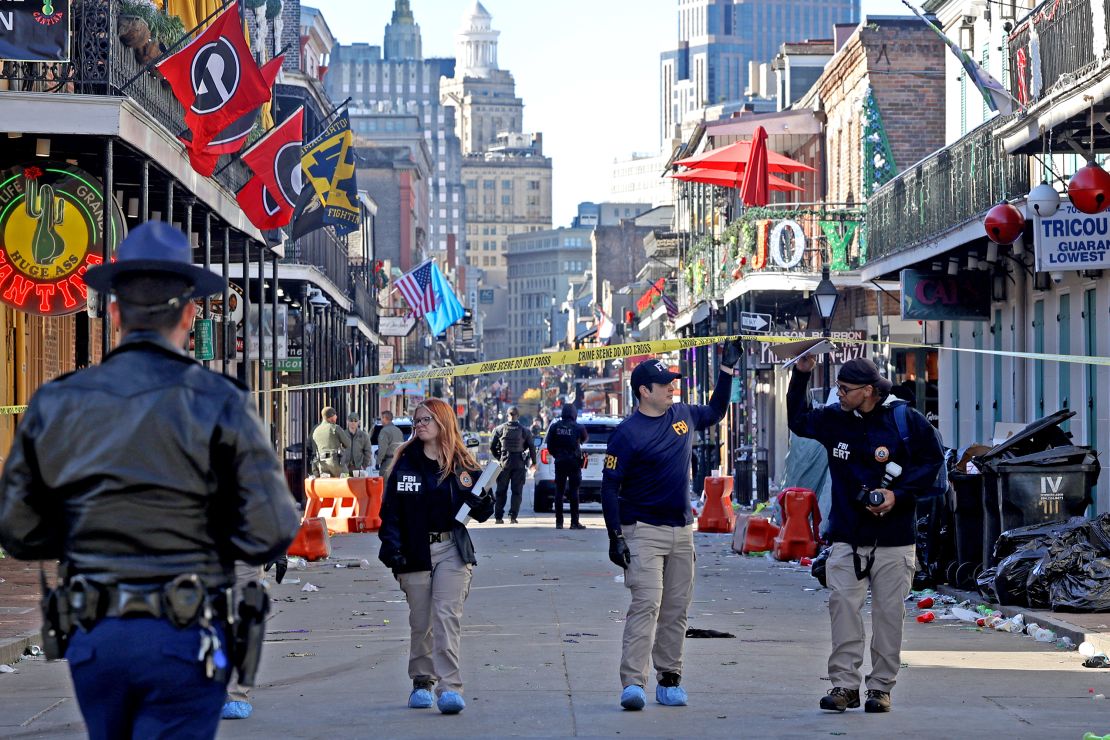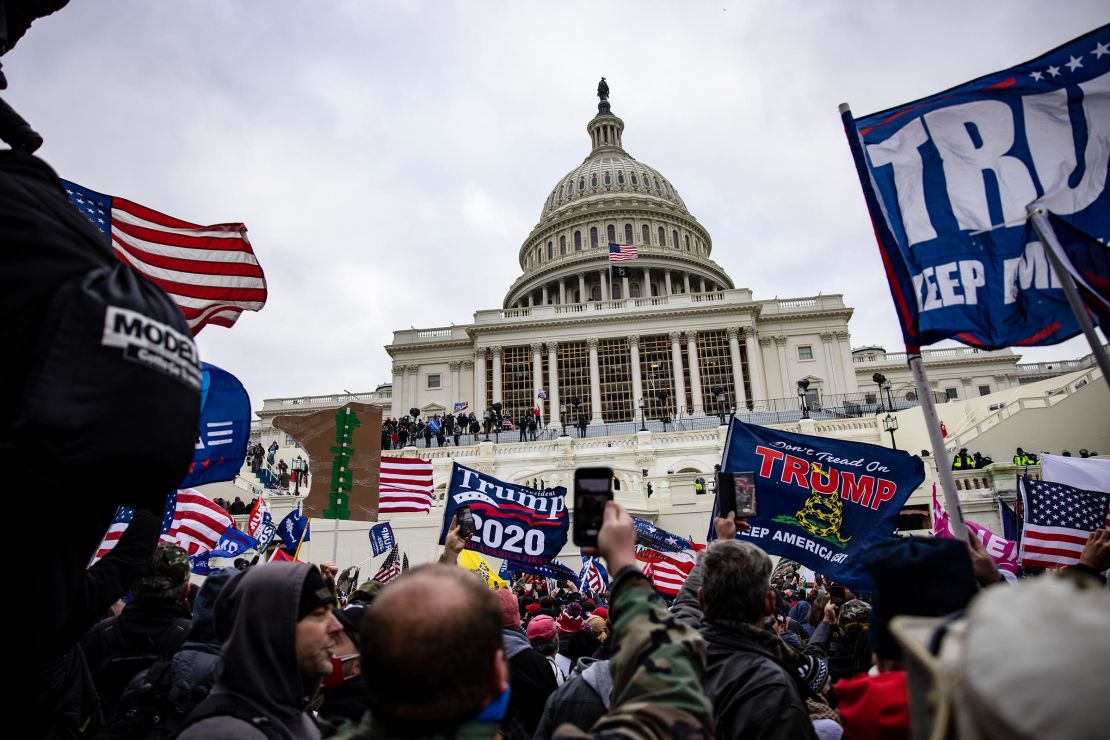CNN
—
Editor’s Note: This is the fourth of a five-part series that looks at how Donald Trump mounted the greatest comeback in American political history, how he is preparing for what he and his own team describe as a potentially tumultuous second term, and what all that might mean for those who support him — and those who don’t. Read parts one, two and three.
When the shiny white pickup turns off of Canal Street, the new year is just hours old and none of the revelers in New Orleans’ famed French Quarter can know what is coming their way. Neither can the police officers who race toward the screams of those being run down as the vehicle plows through the crowd. The assault will leave 14 people dead and many more injured, including two officers shot by the armed driver, and that gunman dying in the street from return fire. Investigators call it a terrorist attack inspired by ISIS.
Within hours, Fox News reports the truck crossed the US border with Mexico two days earlier. The story seems to fit perfectly into the far-right narrative of violent extremists sneaking into the country in a flood of undocumented immigrants. President-elect Donald Trump, a longtime Fox fan, rapidly takes to the internet to post about “criminals coming in” from other countries. He expands on the thought over the next 24 hours, and other prominent Republicans echo his words.
“I said, many times during Rallies, and elsewhere, that Radical Islamic Terrorism, and other forms of violent crime, will become so bad in America that it will become hard to even imagine or believe,” Trump writes on Truth Social, laying his accusations at the door of President Joe Biden’s administration. “That time has come, only worse than ever imagined.”
But Fox’s initial report was wrong. The network walked it back about an hour and a half later, with an on-air correspondent saying, “Our sources now tell Fox that that truck from Eagle Pass, Texas, did not cross two days ago. It crossed on November 16, and the identification of the driver that crossed the border does not appear to be the shooter.”
The gunman was a US citizen and an Army veteran. The truck was rented. The border crossing was two months earlier and had no connection to the attack. But Trump steams on, implying the horrific actions of a radicalized American were somehow the result of Biden’s immigration policies. As incoming president, Trump could have easily requested the facts from investigators before he made even the first erroneous claim.
How Trump views the concept of truth has been the subject of many discussions. New York Times reporter and CNN political analyst Maggie Haberman, who has been on the billionaire’s trail for years, once suggested Trump sees truth as whatever he can get away with. When media fact-checkers point out Trump’s lies, a common response among voters who like Trump is the facts don’t always tell the truth … he does. In other words, many of his supporters fully comprehend the statistics, experts and media reports telling them crime is low, inflation is under control and undocumented immigrants have not taken over the country. But those facts clash with the truth of their feelings: Crime feels scary, prices feel too high, and societal changes in their communities — which many areas have undeniably experienced — can feel deeply unsettling.
Trump’s casual shifts between truth and falsehood hint that he instinctively knows what researcher Drew Westen wrote in “The Political Brain” in 2008: “In politics, when reason and emotion collide, emotion invariably wins.”
And just as Trump has whipped up his base with baseless claims about the attack in New Orleans, with the inauguration drawing ever closer, he appears to be indulging another feeling that has drawn some of the loudest and lustiest cheers at his rallies: his desire for revenge.

“When this election is over … I would have every right to go after them,” Trump said of his political opponents during an interview over the summer.
Such comments have been piling up for months, years even, and critics are now venting their fears that Trump will weaponize the Department of Justice to go after those he says have wronged him: Biden and his family; former President Barack Obama; former Secretary of State Hillary Clinton; former Director of the National Institute of Allergy and Infectious Diseases Anthony Fauci, who became the face of the US response to the Covid-19 pandemic; people involved in investigating and prosecuting Trump for alleged crimes; and more. Trump has done little to tamp down that anxiety, and now he has picked someone who seems suited to the task to be his director of the FBI: Kash Patel.
“Kash is a brilliant lawyer, investigator, and ‘America First’ fighter who has spent his career exposing corruption, defending Justice, and protecting the American People,” Trump posted in November, throwing his weight firmly behind the selection. The response from the president-elect’s former national security adviser, John Bolton, is just as firm. “The Senate should reject this nomination 100-0,” he tells CNN. A Washington Post headline says, “Kash Patel has an enemies list centered on grievance.” The Atlantic trumpets Patel as “The Man Who Will Do Anything for Trump.”
Some of Patel’s appeal as FBI head might rest in his pitch-perfect harmony at the height of the legal cases against Trump. “He is being victimized,” Patel shouted outside a court and over the noise of anti-Trump protesters, “but we as a country are being victimized more by the unconstitutional weaponization of justice!”
Patel has been a public defender, a federal prosecutor, a congressional aide and played a part in national security during the first Trump administration. He’s also a champion of dismantling the so-called deep state, including the FBI. In Patel’s telling, federal employees, elected leaders, business tycoons and others whom he refers to as “government gangsters” function as an “unelected bureaucracy” suppressing the will and voices of conservatives.
Trump insists he will not direct all of Patel’s actions. But critics say Trump would not have to name targets for his new FBI boss. The president-elect already has — for example, members of the House select committee that investigated Trump’s role in the January 6, 2021, attack on the US Capitol.
“For what they did,” Trump said on NBC’s “Meet the Press” in December, “honestly, they should go to jail.”
Former Wyoming Rep. Liz Cheney, a chief GOP critic of the former president, was vice chair of the committee and is clearly on Trump’s list. Never mind that some Republicans defend her. “She was doing her job,” Fred Upton, a Republican former representative, says. “This was a select committee, it was approved by the House, they had lots of witnesses.”
But some doubt that defense will suffice if Patel is confirmed and set free by Trump to do as he wishes.

Patel’s dedication to Trump can be seen in a peculiar aside. He has written three children’s books that tell the story of Trump’s many trials as thinly veiled fables, with characters such as “Hillary Queenton,” “Sleepy Joe,” “Comma-la-la-la” and, of course, the “MAGA King.”
And when it comes to publishing, Patel has indicated his quest for the kind of justice Trump wants will show no deference to the Fourth Estate, which is another front in the president-elect’s campaign for retribution.
“Yes, we’re going to come after the people in the media who lied about American citizens, who helped Joe Biden rig presidential elections — we’re going to come after you,” Patel told Trump’s longtime ally Steve Bannon in a 2023 interview.
“We have to straighten out the press,” Trump said in mid-December at his first news conference since winning a second term and just days after ABC News agreed to pay $15 million to settle a defamation suit with the president-elect. “Our press is very corrupt, almost as corrupt as our elections,” Trump added. Since then, he’s filed a lawsuit against The Des Moines Register newspaper and a renowned pollster over a pre-election poll that didn’t show him ahead of Vice President Kamala Harris in Iowa. He is also suing CBS’ “60 Minutes” for how an interview was edited, in which he did not even appear. He’s sued authors who have written unfavorably about him. The list goes on.
Legal and business analysts argue that the lawsuits don’t have to be well founded or successful to be economically damaging and that just filing them can cast a chill on journalism. Throw the FBI into the mix, and critics say the danger grows of reporters being hauled into court for what might otherwise be seen as routine coverage.
Speaking of courts, another development in the wake of Trump’s victory has also substantially cleared his calendar, giving him more time for considering his grievances. His legal troubles are largely vanishing.
Pending cases about his efforts to overturn the 2020 election and mishandling of classified documents have been dropped by the Justice Department’s appointed special counsel, Jack Smith. He says he produced enough evidence to indict Trump in both, and he still defends the merits of the cases. Now, however, he is letting them go because of a long-standing Justice Department rule against the prosecution of a sitting president. With their positions untenable under Trump, Smith himself will resign before Inauguration Day, as will FBI Director Christopher Wray, a Trump appointee who still has several years left in his term.
“Things are looking pretty good for Donald Trump,” says CNN’s chief legal affairs correspondent Paula Reid a few weeks before inauguration, noting that the Georgia state election fraud case is also “on life support” after Fulton County District Attorney Fani Willis was disqualified over a “significant appearance of impropriety” because of a romantic relationship with a fellow prosecutor.
Trump has been convicted of 34 felony charges for business fraud in New York, but his lawyers are trying to get the case tossed. He has denied wrongdoing in all the cases against him.
Of course, Trump is not entirely free of thinking about the courts. There is the matter of his many supporters in legal trouble for their parts in the January 6, 2021, assault on the Capitol. The investigation has been described as the largest in the history of the Department of Justice, with more than 1,400 people from across the country charged with crimes, hundreds pleading guilty and others convicted. Some have been sentenced to years behind bars.
The level of participation varies from those who smashed windows and doors, to those who attacked police officers with flagpoles, hockey sticks and bear spray, to those who ransacked the chambers of Congress, to those who simply drifted into the building and wandered around while officers were injured.
Trump has long flirted with conspiracy theories about what happened. Sometimes he grabs onto the right-wing claim that the FBI or the radical left group Antifa was involved. Since winning a second term, he has suggested at least once that the Middle East terror group Hezbollah might have had something to do with it. There is no evidence for any of that.
But there is tremendous pressure from the families of those who have been arrested for Trump to give them pardons. All of them. Since the election, some defendants have been openly defiant as judges try to address them in court, insisting Trump will set them free no matter what ruling comes down.
Vice President-elect JD Vance says the Justice Department was unfair to some of the protesters, but he balks at the idea everyone should be off the hook. “If you committed violence on that day,” the Ohio Republican says, “obviously, you shouldn’t be pardoned.”
Still, Trump won’t reveal precisely where he will land. Letting too few of the attackers go free risks backlash from his base, many of whom have bought into Trump’s recasting of that day as peaceful, filled with “patriotism” and “love.” But ignoring brutal attacks on police risks having some officers and their families calling the new president a hypocrite.
“(Republicans) used to be the party of law and order,” says Democratic strategist Ashley Etienne, “and now all of a sudden they’re going to look the other way while Donald Trump pardons people who attacked the Capitol building?”
So Trump is straddling the fence. “We’ll be looking at the whole thing, but I’ll be making major pardons, yes,” he says at a Mar-a-Lago news conference in early January.

On the Democratic side of the aisle, a parlor game has begun as people guess whether Biden will grant preemptive pardons to those Trump might target. It is a fraught choice. If Biden makes the move, the pardons could suggest those people needed protection because they did something wrong — at least pundits expect Trump and his allies would make that claim. But if Biden does not put shields in place, Trump — perhaps with the aid of Patel — could unleash a criminal purge of his enemies. Again, just as it is with Trump’s attacks on the media, the cases would not need to succeed in the long run. In the short run they could drain time and resources from Trump’s opponents and create a reign of fear for anyone crossing the new commander in chief.
Online, opinion columnists fret about what they call Trump’s “Revenge Tour,” and the dark humor of the phrase is available on T-shirts, bumper stickers and tote bags. But no one knows Trump’s true intent. Perhaps not even Trump. In his 2016 campaign, he frequently smirked as his rally crowds responded to any mention of his opponent Hillary Clinton with chants of “Lock her up! Lock her up!” At times, he suggested he wanted that too. “Hillary Clinton has to go to jail, OK? She has to go to jail,” he said in a California speech in June 2016.
In office, he generally denied uttering such words, and he took no action. But in his losing 2020 bid, he was back at it, telling a rally crowd in Georgia: “You should lock them up. Lock up the Bidens. Lock up Hillary.” And scarcely a day passed in the 2024 race that he didn’t say he was being persecuted and that those responsible should be punished.
It’s unclear whether his party would support a broad, political vendetta.
“Depends on if you’re talking House or Senate,” says CNN congressional correspondent Lauren Fox. “I think there is a discrepancy between more loyal House Republicans who hail from districts that are solidly conservative, and some Republican senators who might hail from swing states (and) maybe are closer to the establishment wing of the party.”
The answer is equally murky to what may be a more important question: If Trump satisfies his hunger for revenge, will it match the tastes of his voters?
Republican strategist Shermichael Singleton admits the die-hard MAGA crowd may crave it. But he says Trump won because voters outside the MAGA core came to his side wanting a better economy and a curb on inflation, not necessarily all the other baggage Trump is bringing to the White House.
“I think if you’re focused on the past and that overcomes and overshadows everything else, then you start to lose people,” Singleton says. “It really was those soft voters that gave him the victory. They got him across the finish line.”
And among those people looking for hope and a new future in a nation still recovering from the pandemic, there may be little patience for a leader who wastes time settling old scores.
